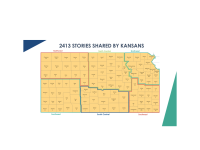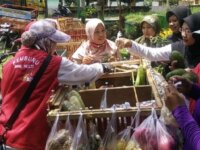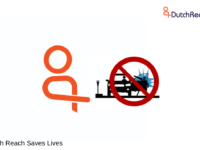New products and new ways of working are needed in order to meet the future challenges in healthcare.
The ability of healthcare professionals to create and innovate new products and working methods is however underutilized. Närhälsan Färgelanda, Primary Health Care Centre, has launched an innovation project in collaboration with private companies that aims at empowering healthcare professionals to create, innovate and develop new products and working methods that meet the future needs.
Innovation Tag: Social Innovation
The State of Kansas piloted ‘Our Tomorrows,’ a novel framework to capture family experiences about thriving and surviving, to ensure that policies and practices meet the needs of families. The approach makes a large amount of data (over 2,500 narratives) directly accessible to decision-makers and the individuals who provided it. Communities make sense of patterns that emerge from stories to create a portfolio of small actions that will make Kansas the best place to raise a child.
In Banyuwangi of Indonesia, one of the districts in East Java, 16 pregnant women died in 2015, as well as 28 babies. The largest contributing factor was a lack of data concerning the existence and whereabouts of women with high-risk pregnancies. So, in 2016, Sempu Public Healthcare Center launched an innovative solution using female vegetable sellers on motorbikes as high risk pregnancy seekers. As a result, the number of women and babies dying during and/or shortly after childbirth fell to…
Dutch Reach Project (DRP) closes a serious gap in existing road safety efforts to prevent “dooring,” a common, feared & at times fatal crash caused when exiting motorists - using their near hand - suddenly throw open their car door into the path of a bicyclist or other vulnerable road user (VRU).
To prevent dooring, DRP promotes the Dutch Reach (DR): reaching across to the door with the far hand to open - a much safer method.
The DR project is already gaining increasing attention and being…
The Arlington Restaurant Initiative (ARI) is a voluntary accreditation program which aims to increase safety and economic viability for restaurants and special events in Arlington County, VA. The Police Department has partnered with County agencies to establish a holistic approach to nightlife management and raise standards of restaurants that serve alcohol. ARI has been successful in reducing alcohol-related violence and building mutually-beneficial relationships with stakeholders.
Combining Design Thinking and Rapid Impact Evaluation methodologies allows for a user-centered counterfactual to measure the impact of the current program design, while simultaneously identifying programmatic design flaws and generating solutions for improvement. The participative process for co-developing the counterfactual triangulates multiple user perspectives and data sets to provide new lines of evidence to pursue innovative solutions and offer a more iterative approach to evaluation.
Societal challenges such as demographic change affects rural areas in particular. The Social Foresight Lab is an innovative participatory approach towards rural development and technology transfer to address these challenges. It combines foresight, needs assessment and strategy development. Rural areas benefit, as it takes into account regional characteristics, initiates new cooperations among regional stakeholders, and integrates technological and social innovations into regional development.
In most countries residents are entitled to a number of social benefits, but few people ultimately claim these benefits as they may be unaware of them, of who is eligible, how to apply for them etc. Israel was no different, until recently when Kol Zchut developed www.kolzchut.org.il, which holds over 6,000 information pages, serving more than 6 million unique users annually (>50% of Israelis), dramatically increasing public accessibility to information, and boosting claims to benefits.
Rescuebusters is an interactive 3D-animated game that specializes in youth safety education. It is an unique teaching tool that brings practical examples alongside theoretical learning with animated, real-life based tasks. Rescuebusters offers an immersive world with distinctive, sympathetic characters, unique game mechanisms and development tracking which take teaching to a whole new level.
Community Connects is a pilot project that came out of the Transportation Innovation Lab. Problem/Opportunity: Cape Breton Regional Municipality (CBRM) is a region with high levels of poverty and unemployment. Innovation: Taxi service, doorstep pick-up, defined drop-off points, flat rate: $7 seat. Why innovative? In short, the approach (social innovation lab) and those that were engaged (first-voice participants).




